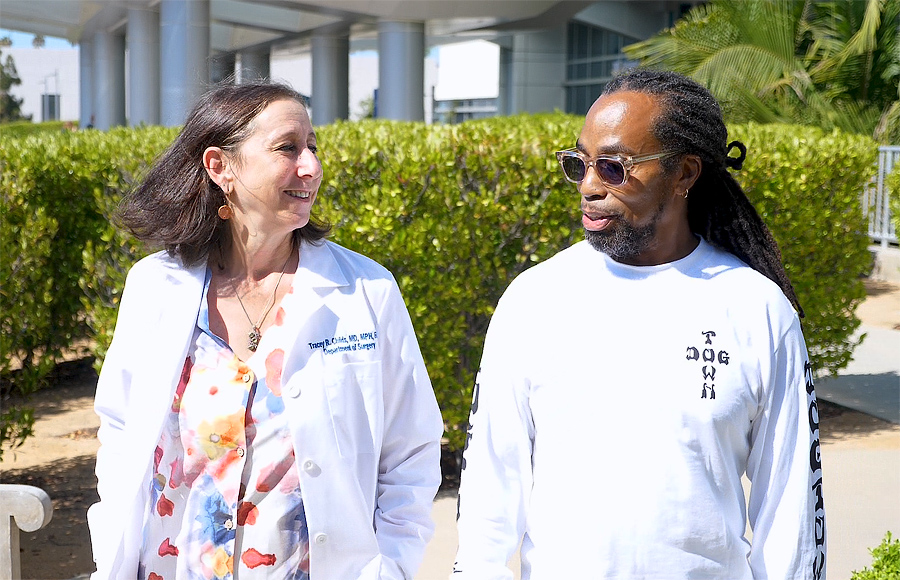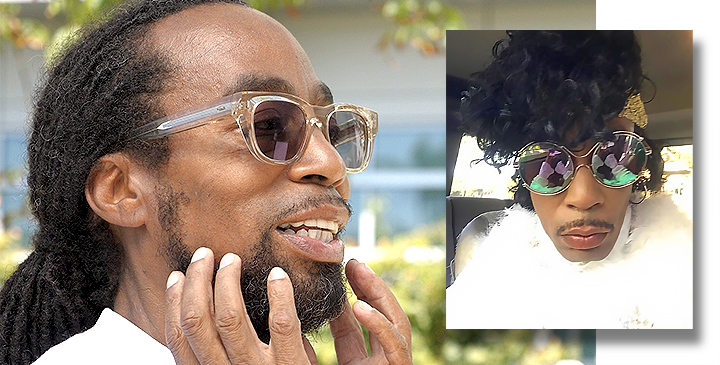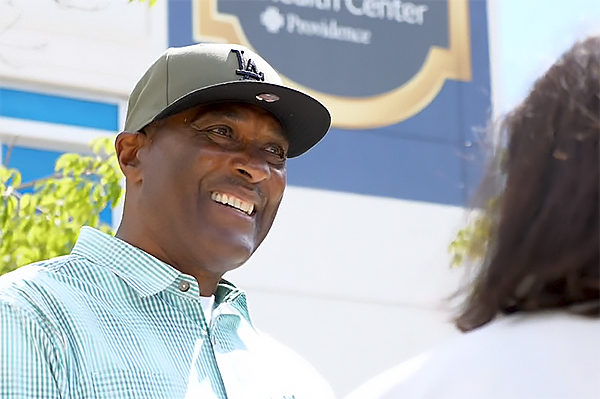
Uncommon Care at Saint John’s
Elridge Cavitt thought about his two sons, who were very young, and of course, his wife. “When I learned I had cancer, in that moment, I had a sick feeling… [my mind] just went blank.”
Throughout his testimonial, one thing resonated: Elridge was amazed by the scope of care he received at Saint John’s Health Center. This was surprising to him because the initial shock of the diagnosis left him with a lot of fear and uncertainty; he was not expecting to feel like everything was going to be “okay,” or even so soon. Many of his discomforts: physical discomfort, mental discomfort, and even spiritual, he was able to move beyond because he felt his care team was there right behind him and leading him in a direction where he could see past cancer. It was more than reassuring. It uplifted and motivated him.
“She told me exactly like, this is what it’s going to be like, and I believed them. And that belief, not even knowing truly in my heart what the results were going to be…, and knowing they had a plan, and knowing they had my genuine best interests at heart.., I wasn’t just another number. It motivated me…, despite what I was feeling. Some days I could only take five steps and some days I take 100.”
Elridge continued to develop trust in his “dream team.” Whether he was meeting with Dr. Childs, Dr. Wollman, or Dr. Fischer, his care team graced him with a level of confidence not typically seen in health care because they all worked seamlessly together. “They laid it out every step of the way.”
Elridge was diagnosed in late 2021 with stage 2 rectal cancer. At the time, his wife pushed him to go to his primary care physician after experiencing occasional blood in his stool. Such findings do not necessarily mean one has colorectal cancer, but it could be a symptom, and to make a definite diagnosis, one would need a colonoscopy. If a growth is found, a biopsy is needed to determine if it is cancerous and how far it may have spread.
Listen to Elridge Cavitt’s amazing story
Elridge Cavitt interviews with Saint John’s Cancer Institute, August of 2022.
Treating Stage 2 Rectal Cancer
His primary care physician referred Elridge to Dr. Tracey Childs. “As soon as I saw her,” Elridge describes, “I didn’t feel like I was just some patient.” Dr. Childs is Chief of Surgery at Providence, Saint John’s Health Center, and Adjunct Assistant Professor, Surgery at Saint John’s Cancer Institute.
While Elridge was being examined, his wife, a biology teacher, was asked if she would like to have a look at the tumor. Dr. Childs then said, “This is going to be pretty interesting, but you are probably going to be okay.” Jubilantly, Elridge commented, “This is Real People right here,” referring to the 70s TV reality show that profiled human interest stories.
Because Eldridge’s cancer extended into the rectal wall (outside the primary tumor site), removing his tumor surgically wouldn’t be enough to prevent cancer recurrence. His treatment plan needed to include Total Neoadjuvant Therapy, what Elridge referred to in his testimony as, “TNT.” TNT treats locally advanced rectal cancers by first treating the affected area with chemotherapy and radiation to shrink the size of the tumor(s) before surgically removing it. This is followed by adjuvant chemotherapy and/or radiation.1 This approach requires more than one oncology specialist. Furthermore, clinical trials have shown TNT to improve outcomes by decreasing local recurrence and increasing the 3-to-5-year survival rates.3,4
“I am blessed with like an off-the-charts team.”
After his examination with Dr. Tracy Childs, Elridge met the rest of his care team, Dr. Robert Wollman, Assistant Professor of Radiation Oncology, and Dr. Sean Fischer, Adjunct Assistant Professor of Medical Oncology at Saint John’s Cancer Institute. Elridge immediately felt relieved by the care and consideration both specialists showed him. After a brief tour of the treatment room and making light of the situation to help calm Elridge, Dr. Wollman broke down the reason why he felt strongly about Elridge’s outlook and said, “Look, let me tell you something. There’s Big-C and then there’s Little-C. It’s a little C.” Dr. Wollman further adds, “You’re going to ring that bell!” After completing radiation treatment at Saint John’s, patients get to ring a bell that hangs outside the treatment area to signify a major milestone in their progress. In the video interview, Elridge taps his chest repeatedly referring to his care team as, “The truth.”
“I trust you [Dr. Childs]. I’ll start tomorrow if you have an opening.”
Elridge underwent surgery on February 9th, 2022, and went home with a catheter a few days later. “I wasn’t even concerned about [the catheter]…that’s just a little something that happens…, but they prepared me with the information.” By providing Elridge with an understanding of his treatment (what was going to happen and when), his circumstances no longer threatened his sense of well-being. This afforded him with greater optimism for his outcome, allowed him to remain positive even during the most challenging days, and gave him a newfound awareness to persevere.

“It’s really going better than I anticipated…the support is just phenomenal.”
“I had a team and their views and belief systems were as one.” This was a demonstration of multi-disciplinary, collaborative care, which was very special to Elridge. “It genuinely feels like this wasn’t just a job for them,” Elridge stated, adding what he observed as, “We love what we do and we love the people that we do it with and for.”
Cancer-Free Patient Helps Elridge Throughout His Treatment

“Wade came a few times while I was doing chemo, …when I was going to have surgery, …when I was going to have my port put in, …he didn’t bring me pickles but he told me about it and he was right!”
Wade also told Elridget to get some good gloves because touching hot and cold during chemotherapy can cause hypersensitivity. Wade also pushed Elridge to eat, including while recieving chemotherapy treatments. Elridge explains, “He’s like, bring some food to chemo!” continuously asking Elridge, “You eating?” Wade was a tremendous uplift and Elridge admired his motivation. “His spirit is so alive.” Wade told him, “It’s going to be Ok, you’re with the best of the best of the best.” Successful cancer treatment is more than just having the best support; it’s seeing the finish line and knowing you can get there. “I felt so honored…”I had someone and literally…I was going through the same thing that they had been through.” Elridge adds, “If I get to that place, I want to give that to somebody.”
Elridge Provides Advice for Fighting Cancer
- Maintain an open mind when going through this process, not just mentally, but spiritually.
- Do whatever it takes to avoid isolation and not shut down because there’s a lot of support. When I heard I had cancer, I wanted to shut down and run away… to disappear.
- I don’t know where I’d be without my wife. She pushed me to go to the doctor and would not let me off the hook. She was so solid, even in her own discomfort and fears. She didn’t pressure me. She was able to explain to the kids that I was going to be Ok when they could see that I didn’t feel the best.
“I just want to say to the team…I love you y’all…you’re the best.”
Colorectal Cancer Facts
In 2022, 151,030 colon and rectum cancers were diagnosed: 80,690 were men, and 70,340 were women. Second to lung cancer deaths, colon, and rectum cancers are still the 2nd leading causes of cancer deaths in the US. With 28,400 men, and 24,180 women in 2020. The relative survival rate is 65.1 percent and affects Asian pacific islanders, Native Americans/Alaskan natives, and non-Hispanic black communities predominantly.2
Because of how many people are being diagnosed with late-stage colon cancer, the screening age for colorectal cancer has been recently reduced to 45 years of age from 50 years; people are not catching it early enough. According to Dr. Anton Bilchik, Chief of Surgery, and GI surgical oncologist at Saint John’s Health Center, the age should really be 40 years old, which would catch more cancer in its earliest stage.
Sources
1Rectal Cancer Treatment (PDQ®)–Patient Version – NCI
2Rectal Cancer Treatment, by Stage | How to Treat Rectal Cancer
3 Total neoadjuvant therapy for rectal cancer: An emerging option – PubMed (nih.gov)
4Locally advanced rectal cancer: The past, present, and future – PubMed (nih.gov)

